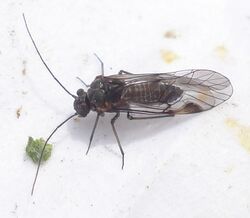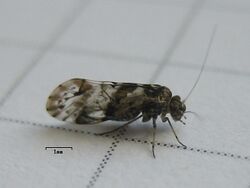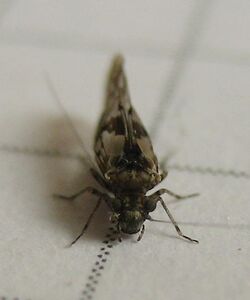Biology:Psocidae
From HandWiki
Short description: Family of booklice
| Psocidae | |
|---|---|

| |
| Amphigerontia contaminata | |
| Scientific classification | |
| Script error: No such module "Taxobox ranks".: | Animalia |
| Script error: No such module "Taxobox ranks".: | Arthropoda |
| Script error: No such module "Taxobox ranks".: | Insecta |
| Script error: No such module "Taxobox ranks".: | Psocodea |
| Script error: No such module "Taxobox ranks".: | Psocomorpha |
| Script error: No such module "Taxobox ranks".: | Psocetae |
| Script error: No such module "Taxobox ranks".: | Psocidae |
| Subfamilies | |
| |


Psocidae is a family of barklice in the order Psocodea (formerly Psocoptera).[1]
Members of this family are recognized by their wing-venation, where the areola postica is fused to the M-vein, giving rise to the so-called discoidal cell. This family is closely related to Myopsocidae. The family is widespread, including New Zealand.
Genera
These 86 genera belong to the family Psocidae:
- Amphigerontia Kolbe, 1880 i c g b
- Anomaloblaste c g
- Arabopsocus c g
- Atlantopsocus c g
- Atrichadenotecnum c g
- Atropsocus Mockford, 1993 i c g b
- Barrowia c g
- Blaste Kolbe, 1883 i c g b
- Blastopsocidus c g
- Blastopsocus Roesler, 1943 i c g b
- Brachinodiscus c g
- Camelopsocus Mockford, 1965 i c g b
- Cephalopsocus c g
- Cerastipsocus Kolbe, 1884 i c g b
- Ceratostigma c g
- Cervopsocus c g
- Chaetoblaste c g
- Chaetopsocidus c g
- Chilopsocus c g
- Clematoscenea c g
- Clematostigma c g
- Copostigma c g
- Cycetes c g
- Cyclotus Swainson, 1840 i c g
- Dactylopsocus c g
- Dictyopsocus c g
- Diplacanthoda c g
- Disopsocus c g
- Elaphopsocoides c g
- Elaphopsocus c g
- Elytropsocus c g
- Epiblaste c g
- Eremopsocus c g
- Euclismioides c g
- Fashenglianus c g
- Ghesquierella c g
- Gigantopsocus c g
- Glossoblaste c g
- Hyalopsocus Roesler, 1954 i c g b
- Hybopsocus c g
- Indiopsocus Mockford, 1974 i c g b
- Indoblaste c g
- Javablaste c g
- Javapsocus c g
- Kaindipsocus c g
- Kimunpsocus c g
- Lacroixiella c g
- Lasiopsocus c g
- Lativalva c g
- Lipsocus c g
- Loensia Enderlein, 1924 i c g b
- Longivalvus c g
- Lubricus c g
- Mecampsis c g
- Metylophorus Pearman, 1932 i c g b
- Neoblaste c g
- Neopsocopsis c g
- Neopsocus c g
- Ophthalmopsocus c g
- Oreopsocus c g
- Pearmania c g
- Pilipsocus c g
- Poecilopsocus c g
- Pogonopsocus c g
- Propsococerastis c g
- Pseudoclematus c g
- Pseudoptycta c g
- Psocidus c g
- Psococerastis c g
- Psocomesites c g
- Psocus Latreille, 1794 i c g b
- Ptycta Enderlein, 1925 i c g b
- Sacopsocus c g
- Sciadionopsocus c g
- Setopsocus c g
- Sigmatoneura c g
- Steleops Enderlein, 1910 i c g b
- Stylatopsocus c g
- Sundapsocus c g
- Symbiopsocus c g
- Tanystigma c g
- Thyrsophorus c g
- Thyrsopsocopsis c g
- Thyrsopsocus c g
- Trichadenopsocus c g
- Trichadenotecnum Enderlein, 1909 i c g b
Data sources: i = ITIS,[2] c = Catalogue of Life,[3] g = GBIF,[4] b = Bugguide.net[5]
References
- ↑ Johnson, Kevin P.; Smith, Vincent S. (2021). "Psocodea species file online, Version 5.0". http://psocodea.speciesfile.org/.
- ↑ "Psocidae Report". https://www.itis.gov/servlet/SingleRpt/SingleRpt?search_topic=TSN&search_value=103331.
- ↑ "Browse Psocidae". http://www.catalogueoflife.org/col/browse/tree/id/c9536b7330d5e12e09cf4e9909f63c7b.
- ↑ "Psocidae". https://www.gbif.org/species/7942.
- ↑ "Psocidae Family Information". https://bugguide.net/node/view/83277.
- Lienhard, C. & Smithers, C. N. 2002. Psocoptera (Insecta): World Catalogue and Bibliography. Instrumenta Biodiversitatis, vol. 5. Muséum d'histoire naturelle, Genève.
Wikidata ☰ Q3430220 entry
 |
